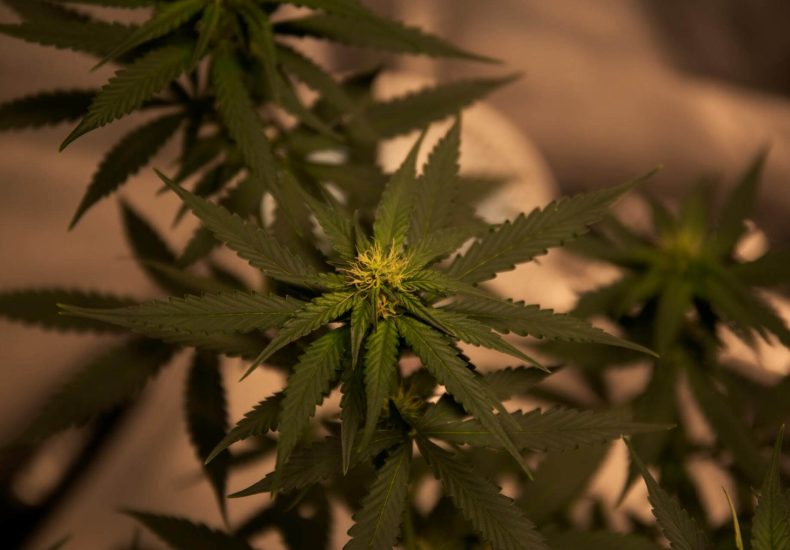 Cannabis
Cannabis
Table of Contents
Common myths about cannabis confuse many people today. One fact is, not everything you hear about cannabis is true. This article will clear up the common misconceptions about cannabis. Keep reading to learn more!
Myths About the Use and Effects of Cannabis
Many people think cannabis is not addictive and that everyone uses it, while believing that it’s safe to drive under the influence. Clearing up these common myths about cannabis can help people make informed decisions about its use.

Not addictive
Cannabis does not hook everyone who tries it. Unlike substances with high addiction rates, the majority of marijuana users do not become dependent. Scientists have found that only a small fraction of those who use cannabis develop an addiction.
This challenges the common misconception linking cannabis directly to addiction issues.
The risk of becoming addicted to marijuana is lower compared to alcohol, tobacco, and other drugs. Studies show that about 9% of people who try marijuana might become dependent on it.
In contrast, substances like nicotine have much higher rates of dependency among users. This data helps dismantle myths about cannabis and sheds light on its addictive properties in comparison to other commonly used substances. Don’t fall for the common myths about cannabis.
Everyone uses it – myths about cannabis…
Contrary to popular belief, not everyone uses cannabis. This is one of the common myths about cannabis. Although its use has become more widespread in recent years, it is not as universally used as many might think. The increasing availability and legalization of cannabis have contributed to its greater visibility, but usage remains subject to various legal and social factors.
Additionally, cultural attitudes towards cannabis use vary widely among different demographics and regions.
Misconceptions about the ubiquity of cannabis consumption can often lead to inaccurate assumptions about its societal impact and acceptance. However, a nuanced understanding of the diverse perspectives on cannabis usage is essential for addressing related myths effectively.
Safe to drive under the influence
Driving under the influence of cannabis is illegal and dangerous. Research shows that marijuana can impair judgment, motor coordination, and reaction time—skills essential for safe driving. This is one of the most dangerous myths about cannabis.
Several studies have found an increased risk of accidents among drivers who use cannabis. This underscores the importance of refraining from driving while under the influence and utilizing alternative transportation methods when using marijuana.
Furthermore, it’s crucial to consider the potential legal consequences and impact on others’ safety before driving after consuming cannabis. The risks associated with impaired driving are significant, emphasizing the need for responsible consumption and consideration for public safety at all times.
Busting the Top 10 Myths About Cannabis, Medicinal and Recreational
Dispelling myths about cannabis for both medicinal and recreational use sheds light on its true effects. Understanding the medical benefits as well as potential risks can lead to informed decisions about its usage.
Medical benefits of cannabis
Cannabis has been found to provide relief for a variety of medical conditions, including chronic pain, epilepsy, and nausea. It also shows promise in managing symptoms associated with multiple sclerosis and arthritis.
Research suggests that cannabis may alleviate anxiety and depression in some individuals. Additionally, cannabinoids found in cannabis have demonstrated potential as anti-inflammatory agents and antioxidants.
Studies also indicate that cannabis can aid in reducing the intensity and frequency of seizures related to certain types of epilepsy. Some patients undergoing chemotherapy have reported decreased vomiting and nausea when using cannabis-based medications.
Comparison to smoking tobacco
Transitioning from the medical benefits of cannabis, it’s essential to address the comparison to smoking tobacco. While both are often inhaled, cannabis smoke contains many of the same harmful chemicals as tobacco smoke, including tar and carbon monoxide.
These substances can damage lung tissue and affect breathing.
Smoking marijuana also involves holding your breath for a longer time compared to smoking cigarettes, resulting in increased exposure to harmful by-products. Despite differences in chemical composition, inhaling any type of smoke can have adverse effects on lung health over time. When it comes to your health, make sure you find if these myths about cannabis are right or wrong.
Possibility of overdose
When it comes to the possibility of overdose, it is crucial to understand that cannabis use carries potential risks. Overconsumption of cannabis can lead to adverse effects such as severe anxiety, paranoia, rapid heart rate, and even hallucinations.
It’s important for individuals using cannabis to be aware of their tolerance levels and consume responsibly. Understanding the potency of different strains and products is essential in avoiding the risk of overconsumption.
Uncover more insights about marijuana misconceptions and debunked myths surrounding its usage by exploring expert opinions on cannabis-related topics.
Link to lung cancer
The association between cannabis use and lung cancer has been a topic of much debate. Research studies have shown conflicting results, with some indicating that there is an increased risk of lung cancer with heavy, long-term cannabis smoking, while others suggest that the risk is not as pronounced as with tobacco smoking.
It’s important to recognize that the smoke from marijuana contains many of the same harmful chemicals as tobacco smoke and can damage the lungs in similar ways.
Using cannabis does not solely revolve around one aspect or belief. Numerous factors need to be considered when evaluating its impact on health, including methods of consumption, frequency, dosage levels, and individual health considerations. It’s important to understand if these myths about cannabis are true or not.
Addictive properties
Moving on from the potential link between cannabis and lung cancer, it’s important to understand its addictive properties. Excessive use of marijuana can lead to dependency for certain individuals, especially when consumed regularly over a long period of time.
Research has shown that cannabis can affect the brain’s reward system, causing some users to develop a psychological addiction. This has raised concerns about the potential for withdrawal symptoms and difficulty in abstaining from its use.
Furthermore, studies have indicated that the Tetrahydrocannabinol (THC) component in cannabis is responsible for its psychoactive effects and may contribute to its addictiveness. While not everyone who uses marijuana will become addicted, it’s crucial to recognize the addictive potential and promote informed decision-making regarding its use.
Effect on memory
Cannabis can affect memory by impairing the ability to form new memories and recall recent events. Short-term use may lead to temporary memory issues, while long-term use can have a more lasting impact on cognitive function.
Research suggests that heavy cannabis use during adolescence could potentially stunt brain development and result in long-lasting effects on memory retention and recall.
Long-term cannabis use has been linked to difficulties with memory retrieval, making it challenging for individuals to remember past events or learn new information. This is particularly concerning when considering the potential impact of cannabis on academic performance and job-related tasks that require strong memory skills.
Being a gateway drug
Transitioning from the effect of cannabis on memory, it’s worth examining the misconception about its potential role as a gateway drug. Contrary to common belief, the idea that cannabis use inevitably leads to harder drug use has been largely debunked by research and expert opinions.
This notion stems from correlation rather than causation – while some individuals who use hard drugs may have also used cannabis, one doesn’t necessarily lead to the other. Various factors play into an individual’s likelihood of trying more potent substances, with cannabis serving only as one part of a complex equation involving personal circumstances and social influences.
Different effects of various forms of cannabis
Different forms of cannabis can produce varying effects on individuals. Smoking marijuana may lead to the rapid onset of intoxication, affecting coordination and cognitive function.
Edibles, on the other hand, have a slower onset but can result in more intense and prolonged effects due to the way THC is metabolized by the liver. Ingesting or inhaling CBD-rich products might not cause euphoria but could provide relief from anxiety and pain.
Each form presents distinct experiences and considerations related to dosage and potency.
Relation to psychosis
The use of cannabis has been linked to psychosis, including symptoms such as hallucinations and delusions. Research indicates that regular and heavy use of high-THC cannabis may increase the risk of developing psychotic disorders in susceptible individuals.
The psychoactive properties of THC can trigger or exacerbate existing mental health conditions, especially in young adults whose brains are still developing.
Furthermore, it is worth noting that consuming cannabis products with higher CBD content may potentially have antipsychotic effects, which can counteract some of the negative impact associated with THC.
Other ways to consume cannabis
Smoking and vaping are not the only ways to consume cannabis. Edibles, tinctures, capsules, and topicals are alternative methods of intake. Each method offers a different onset time and duration of effects.
Edibles take longer to kick in but last longer while tinctures provide faster relief due to their sublingual absorption.
Using concentrates like shatter or wax for dabbing is another option gaining popularity. Dabbing involves vaporizing the concentrate at high temperatures and inhaling the vapor through a water pipe or dab rig.
Clearing Up the Misconceptions with Research and Related Resources
Research and related resources help to dispel misconceptions about cannabis, offering valuable insight into its effects and benefits. Experts’ opinions provide a deeper understanding of the complexities surrounding the use of cannabis.
Personal experiences with cannabis
Many individuals have shared their personal experiences with cannabis, revealing a wide range of effects and outcomes. Some have reported finding relief from chronic pain, anxiety, and insomnia through the use of medicinal cannabis products containing CBD.
Others have described feeling relaxed and euphoric after using THC-dominant strains recreationally. However, some users caution that excessive consumption can lead to negative effects like paranoia or impaired coordination.
Overall, personal experiences with cannabis vary widely and depend on factors such as dosage, strain type, individual tolerance, and mindset.
Furthermore, those who have used cannabis for medical purposes emphasize its potential to improve their quality of life without experiencing the adverse side effects commonly associated with other medications.

Expert opinions on myths
Experts have weighed in on the myths surrounding cannabis, providing valuable insights into its effects and uses. Researchers from various fields have shared their knowledge and findings, shedding light on misconceptions about addiction, health risks, and societal impact.
With a focus on scientific evidence and professional experience, these experts offer a comprehensive understanding of the truth behind common beliefs about cannabis.
Leading authorities in the medical, legal, and social realms have contributed to dispelling misunderstandings about marijuana. Their perspectives debunk false claims while acknowledging potential benefits of cannabis for medicinal and recreational purposes.
Symptoms of withdrawal
Expert opinions on myths have debunked the idea that cannabis isn’t addictive. In fact, symptoms of withdrawal from regular and heavy cannabis use can include irritability, anxiety, mood swings, insomnia, loss of appetite, and physical discomfort.
These symptoms may vary in intensity depending on the individual’s usage level and duration.
Comparisons to other substances highlight that while cannabis withdrawal symptoms are not life-threatening like those of alcohol or opioids, they can still be challenging for some individuals.
Comparisons to other substances
Cannabis is often compared to other substances like alcohol and tobacco. It’s important to note that cannabis has different effects on the body than these substances. Unlike tobacco, cannabis does not contain nicotine and tar, which are harmful to the lungs.
Additionally, moderate cannabis use may have less severe effects on driving ability compared to alcohol consumption. When considering comparisons between cannabis and other substances, it’s crucial to assess each substance independently based on its health effects.
Moving forward into “Debunking Statistics and Claims”..
Debunking statistics and claims
Debunking statistics and claims about cannabis requires careful examination of the evidence. Research findings dispute misconceptions, uncovering the truth behind addiction, secondhand smoke effects, and marijuana’s impact on popular culture.
Dispelling false beliefs is essential for understanding the real effects of cannabis in society. The debunking process challenges long-held views regarding marijuana in light of robust data and expert opinions.
Exploring potential benefits of cannabis
Cannabis has potential benefits for both medical and recreational use. It has been shown to alleviate symptoms associated with chronic pain, epilepsy, multiple sclerosis, and even cancer treatment.
Furthermore, cannabis may offer relief from anxiety and depression. Additionally, research suggests that it can improve appetite and aid in reducing nausea for individuals undergoing chemotherapy or suffering from HIV/AIDS.
These potential therapeutic effects of cannabis have sparked interest in its use as a treatment option for various health conditions.
Furthermore, cannabis offers recreational benefits by inducing relaxation and enhancing sensory experiences. Many users report feelings of euphoria and heightened creativity when consuming cannabis in controlled environments.
Clearing Up Myths About Cannabis
Busting the myths about cannabis has shed light on its true nature. Research and expert opinions have dispelled misconceptions, providing a clearer understanding of its effects and benefits.
By debunking false claims, we pave the way for informed discussions about cannabis in our society. Let’s embrace this newfound clarity to navigate the complexities of marijuana with confidence and knowledge.


